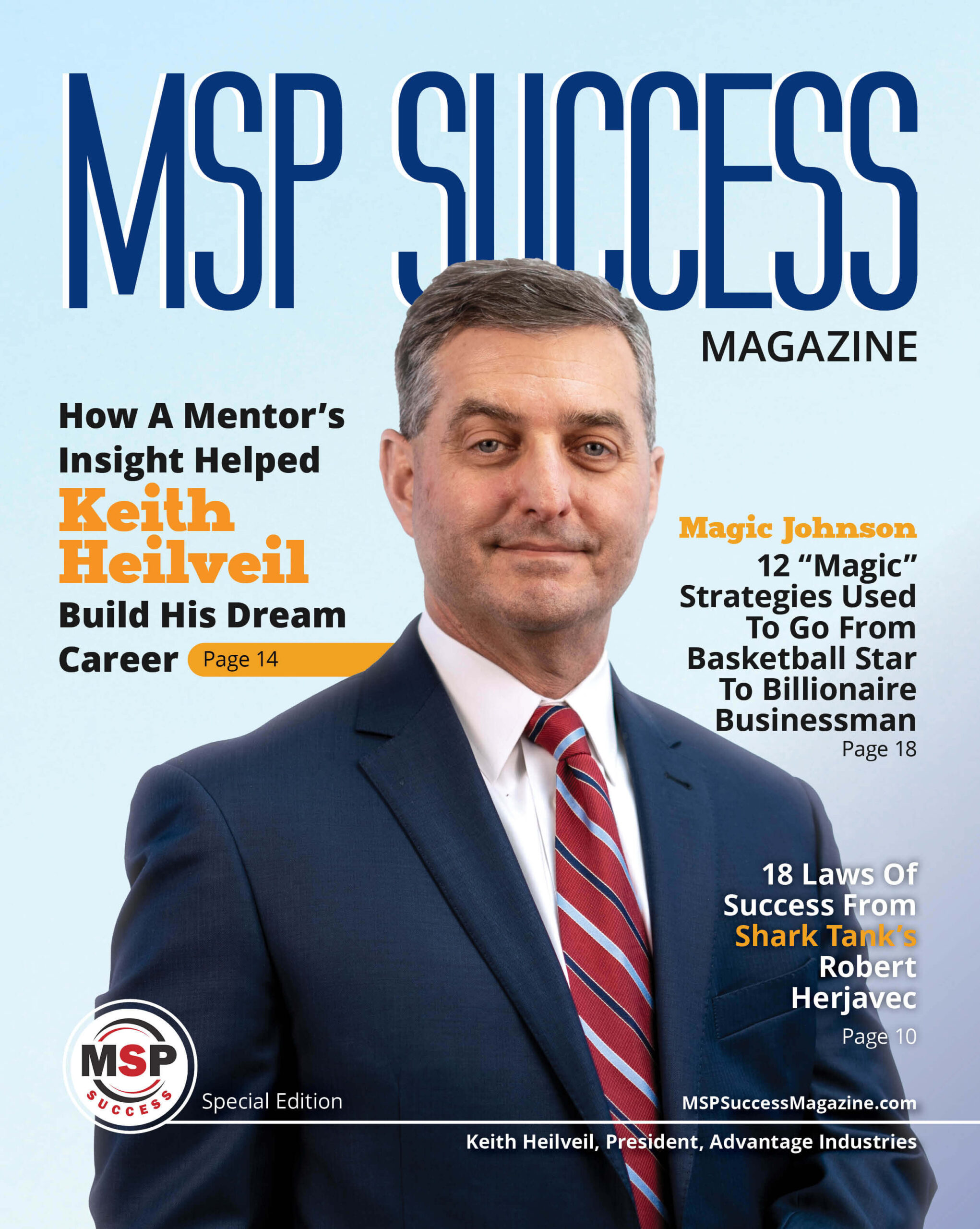At a young age, Keith Heilveil knew his life was not like life on the shows he watched on TV. There was no house with a yard, no family sitting down for dinner at the dining table to tell each other about their days.
His parents were divorcing. His mother started college to become a nurse, and he saw his dad primarily on the weekends when he was home from his job, which was a three-hour commute across state lines. Like many kids in his neighborhood, Keith spent a lot of time on his own or with friends. As a result, he admits, he chose to hang around with the wrong group of kids and caused trouble.

Keith eventually realized he had to make a different choice. Would he continue on his current path or pursue a life that offered more than he currently experienced?
“I was fortunate to see successful professionals and business owners accomplish things I wanted, like a family and a home. I saw two very different worlds,” Keith remembers. “I wanted more. I wanted a house, kids, and a solid family.” He loved and admired his parents. His hardworking father was an important role model. Still, Keith had a vision for his adult life: he would obtain a college degree, and his family would resemble those on the TV shows he used to watch. “People used to say I lived for 20 years ahead. I believe you must see where you want to go,” he says. “I knew what I wanted to accomplish because I saw others accomplishing it.”
Keith knew he wanted to build a fulfilling business aligned with his family values. This powerful motivation became necessary when his vision proved harder to achieve than he had thought it would.
A Promise Made
Keith’s goals drove him to develop a strong work ethic at a very young age. At ten, he was babysitting regularly, and by 12, he had three paper routes and delivered newspapers seven days a week. At age 14, he was working weekends when school was in session and 40 hours a week during the summer months. By the time he was 22, he had founded a home improvement company and bought his first home. Three years later, he married his wife, who shared his values and also hoped for kids someday. But as his responsibilities grew, Keith’s once clear vision of stability and family became much more complicated.
As the project manager for his home improvement business, Keith started his day at 7:00 a.m. By midmorning, he was the finance and contract manager for new work orders. At noon, he worked with the sales team, and by 9:00 p.m., he wrapped up marketing. He labored through grueling 80-hour weeks and rarely had free time for his wife.
“It was a long day, but if you stopped marketing today or tomorrow, you didn’t have business in 60 days,” Keith says. That was the nature of business-to-consumer transactional relationships, but it wasn’t Keith’s nature. “I am about relationships, providing value to clients and helping them grow,” he says. “I couldn’t do that in my company.”
In a few years, Keith and his wife welcomed their first child into their family, but his work hours were still overwhelming. “I was miserable because of the long hours,” he says. “The most important parts of my life are family and health. I couldn’t prioritize my family the way I wanted to in the retail industry. It just wasn’t me. I told my wife that if I couldn’t get to normal hours in two years, I would leave.” Unfortunately, he could not, so he closed the company and started a mortgage-lending business in hopes it would offer the work-life balance he craved.
Running the mortgage company had its perks. It was still business-to-consumer, but now Keith found meeting client expectations easier. “I was definitely helping people out, and the career had good characteristics, but it was volatile,” he says. In the fall of 1998, the mortgage-lending market made a major correction. Keith lost 43% of his monthly income, forcing him back into grueling days. Not only was his time with his family being sacrificed–so was his financial stability. “That was a lightbulb that signaled something had to change. I didn’t know what it was–I just knew I had to change what I was doing,” he says.
A Mentor’s Insight
Despite the challenges that plagued both of his companies, two consistent aspects of his work drove Keith to keep going year after year: application development and computer networking. There was little software to run a small business, so for years, Keith spent evenings at home developing business and accounting applications. Then, someone else noticed his skill and passion for technology.
One afternoon, Keith had sat down to lunch with his business mentor. They had been meeting once a month for years, but this lunch in 1999 proved transformational. Keith explained his dispassion for his two careers and that, after more than a decade of entrepreneurship, he was still struggling to secure the stability he’d always envisioned. His mentor responded to his conundrum with a simple question: “Why aren’t you doing for others what you do in your own businesses?” His mentor had always thought that Keith’s app development work was an unusual niche, but he had an inkling that other people needed the software solutions that Keith was writing. Later that year, at his mentor’s retirement party, he was introduced to another of his mentor’s clients. “My mentor told us, ‘You both can help each other,’” Keith recalls. “That’s where it all started.”
By the end of 1999, Keith turned his evening passion into Advantage Industries. He started offering application development and IT services to clients and helping them improve and grow their business. Client by client, his business expanded. As the company grew, Keith asked his wife if he should keep it small, as planned, or let it grow. “We decided to go for it,” he says. “We hired employees one, two, three, and we really started to build a business.” But this time, he was building a business around his and his wife’s shared family values rather than trying to fit his family into an unforgiving schedule.
Soon, a nine-person team from Advantage was in Mississippi, writing software for grants management in the aftermath of Hurricane Katrina and software programs for national lenders and title companies, some of which ran for more than two decades. “In my earlier industries, we did not have clients continually using our services–only once every few years,” he explains. “But at Advantage Industries, we were always doing things that helped the clients and provided lasting value.”
As technology and the internet became more complex, he noticed his techs spent 50% more time supporting clients with network services. Keith made a strategic decision to create a greater workforce around managed services, and the MSSP side of the business became the organization’s flagship.
As technology advances and client needs continue to evolve and grow, Advantage Industries adds valuable core services like cybersecurity and compliance. “It seems like every couple of years, we’re adding another department to handle another area of technology for our clients,” he says.
As president of Advantage Industries, Keith finally achieved his career goal: instead of being just a one-time benefit to clients, he now offers clients valuable core services that are integral to their operations. That means adapting as tech evolves and ensuring he can provide what clients need to grow their businesses.
“We’re not just doing network infrastructure and cybersecurity; our mission is also operational efficiency and management vision,” he explains. “We’re providing our clients with business analysis and consultation and trying to help them find their operational pain points, which we then work to solve. When we take on a client, we can truly help them grow.”
“Our Place Is Right Here”
Today, Keith jokes that now that he’s older, he looks only 10 years into the future instead of 20. But the commitment he made to himself all those years ago–to build a life around family, health and providing enduring value to clients (maybe a bit of golf, too)–still rings true. At Advantage, he’s built a successful and meaningful life around family and developed his passion for technology in order to provide lasting, valuable service to clients in a way he could never fully realize in his early life and career.
Still, after three decades of entrepreneurship, Keith doesn’t believe he knows everything–no one on the Advantage team does. Being excellent means being willing to participate in lifelong learning. “It’s a continual journey that we’re all on to understand better who we are, how we work, and how we’re going to continuously provide value to our clients,” Keith says. “We genuinely enjoy supporting our clients as well as our employees and their families. We know our place in the world is right here.”
Source: MSP Success Magazine




